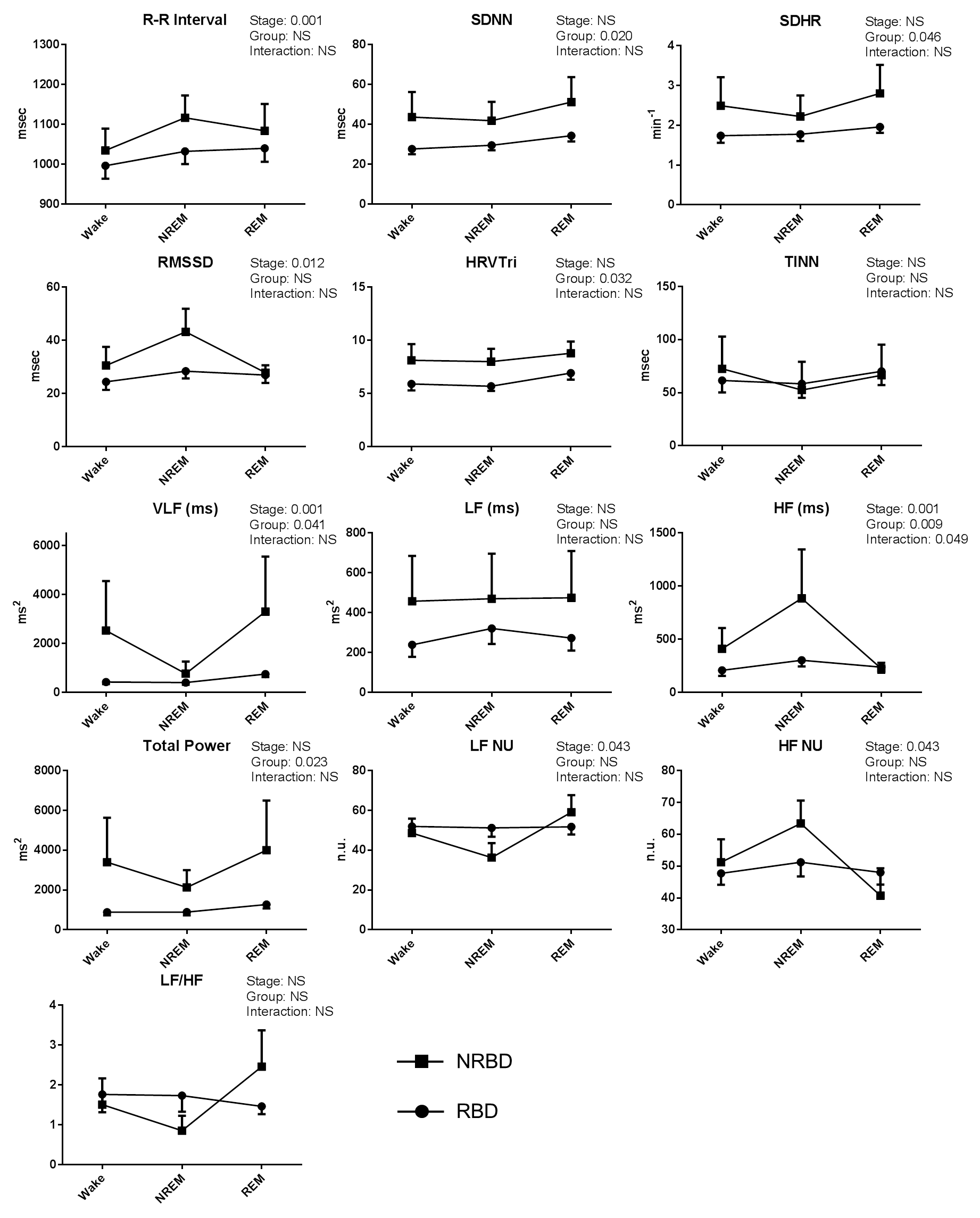Session Information
Date: Monday, June 5, 2017
Session Title: Parkinson's Disease: Non-Motor Symptoms
Session Time: 1:45pm-3:15pm
Location: Exhibit Hall C
Objective: To evaluate Heart Rate Variability (HRV) changes across sleep stages in Parkinson’s Disease (PD) and idiopathic REM Sleep Behavior disorder (RBD) patients, and to access the relation between HRV measures and other non-motor symptoms.
Background: Several studies have reported that HRV, a measure of autonomic system activity, could be blunted in PD patients. It has been suggested that HRV decrease in PD could be a marker of RBD, but study results have been discordant. Divergences have also been found regarding the type of autonomic dysfunction (sympathetic vs. parasympathetic) and relation with sleep stage. There is few information on the relation between HRV changes and other non-motor symptoms in PD.
Methods: We included10 idiopathic RBD patients, 18 PD patients with and 8 PD patients without RBD. HRV measures were extracted from 5-minutes epochs selected from Wake, Non-REM and REM polysomnography records. Non-motor symptoms were evaluated with the Non-Motor Symptom Scale. We compared stage related HRV measures between two sets of groups: PD vs. idiopathic RBD patients and patients with RBD vs. patients without RBD. The relation between non-motor symptoms and HRV variables was analyzed during wake time with Spearmann correlation coefficcient.
Results: Group comparisons:
PD vs. idiopathic RBD patients: there were no significant differences between these two groups.
Patients with RBD (PD with RBD and idiopathic RBD) vs. patients without RBD (PD patients without RBD): sleep stage related variations in Heart Rate Variability were significantly less pronounced in patients with REM sleep behavior disorder than without. Patients with REM sleep behavior disorder presented significantly lower Heart Rate Variability. Stage/Group interaction was significant regarding parasympathetic function. [figure 1.]
Correlation between HRV measures and non-motor symptoms: there were significant, positive correlations between Attention/Memory and Affect/Cognition scores and global and parasympathetic system HRV variables.
Conclusions:
Our study suggests that REM sleep behavior disorder is related with Heart Rate Variability reduction. A significant and positive correlation was found between parasympathetic system measures and cognition and affective symptoms, which deserves further appreciation in future studies.
To cite this abstract in AMA style:
P. Bugalho, M. Mendonça, T. Lampreia, R. Miguel, R. Barbosa, M. Salavisa. Heart rate variability in Parkinson’s Disease and idiopathic REM sleep behavior disorder and relation with other non-motor symptoms [abstract]. Mov Disord. 2017; 32 (suppl 2). https://www.mdsabstracts.org/abstract/heart-rate-variability-in-parkinsons-disease-and-idiopathic-rem-sleep-behavior-disorder-and-relation-with-other-non-motor-symptoms/. Accessed April 18, 2025.« Back to 2017 International Congress
MDS Abstracts - https://www.mdsabstracts.org/abstract/heart-rate-variability-in-parkinsons-disease-and-idiopathic-rem-sleep-behavior-disorder-and-relation-with-other-non-motor-symptoms/

